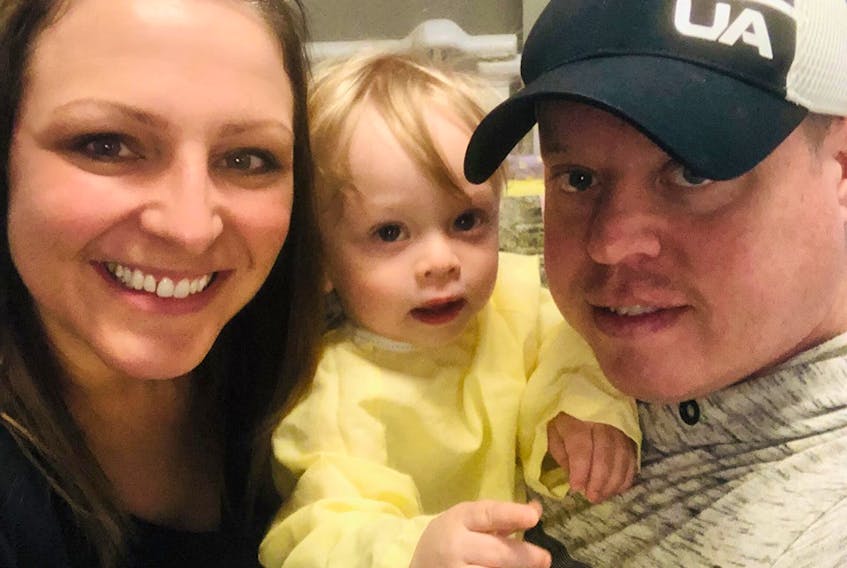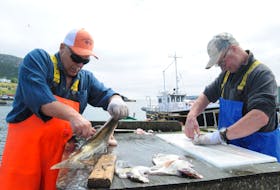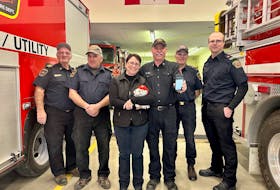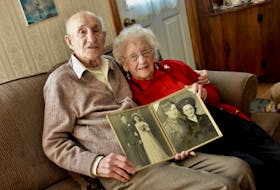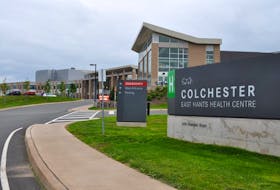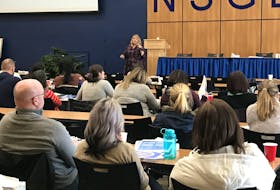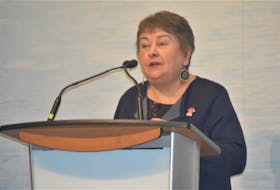LEWIN'S COVE, N.L. — Tears well up in Denika Stewart’s eyes as she talks about the stress of the past year.
“It’s been an emotional roller coaster,” she says. “It’s been an emotional year for us. It’s been a trying year for us.”
Testing after Denika and Darrell Stewart’s son Benjamin was born on March 3, 2018 confirmed his hip joint had not formed normally, a condition known as hip dysplasia.
It’s fairly common, Denika says, and not usually a major issue. In Benjamin’s case, however, it was.
The 16-month-old had a very rare presentation of the ailment, quite possibly because of developmental limitations while he was in the womb, she says.

“What that meant was, not only were his hips out from the sockets, but they were up over the sockets,” she explains.
Difficult pregnancy
Stewart’s pregnancy was a difficult one.
Benjamin was in a pike position with his feet at his head and doctors told the couple he would likely be born that way.
It was unknown at that point if orthopaedic issues would develop as a result, she says.
At 14 weeks, Stewart took a fall at work, resulting in preterm premature rupture of the membranes, or PPROM, the breakage of the amniotic sac before reaching full term.
Six weeks later, after an obstetric ultrasound, she was told there was hardly any amniotic fluid remaining and termination of the pregnancy was recommended.
“I rejected doctors’ notions at the time and I took my chances,” she told The Southern Gazette on June 25.
Stewart was hospitalized on bed rest and given a round of antibiotics. During those six weeks, her membranes resealed.
Benjamin was born premature – though not as early as it was thought he would be – during an emergency section at the Burin Peninsula Health Care Centre. Afterwards, he was rushed to the Janeway Children’s Hospital in St. John’s and spent two weeks in the neonatal intensive care unit (NICU).
Though her baby boy was beautiful, Stewart says Benjamin “looked scary” when he was born, with his legs above his head and turned backwards.
Within a few hours, however, they both had naturally dropped and shifted around.
According to Stewart, doctors believe Benjamin’s survival instincts caused him to ball himself up into the remaining amniotic fluid in her womb and he developed in that position.
Help from Shriners
A Pavlik harness is often used to place and secure the hips of babies born with hip dysplasia in an aligned position with the joint.
Stewart said the device was tried with her son but after a few weeks it was determined there wasn't much of an impact.
A friend who had benefited from medical care through the Shriners told the couple about their experience, and they filled out an application.
Benjamin’s case was accepted and a team at the Shriners Hospital for Children in Montreal went to work. A decision was made to go with open reduction surgery on both hips.
Benjamin had the first surgery on his right hip on April 9, followed by another on his left hip two weeks later. After each, he was fitted with spica casts. Those were then removed and replaced with a sitting cast. In early July, that cast will also come off.
“He’s doing incredible. He’s getting a little bit frustrated now with the casting, but he’s never complained.” — Denika Stewart
Physiotherapy will be required, but the prognosis is good, his mother says.
“All indicators show that he may be able to live a completely normal life,” Stewart says.
“He’s doing incredible. He’s getting a little bit frustrated now with the casting, but he’s never complained.”
The family is extremely thankful to the Shriners for their help, she says.
“I can’t express enough gratitude for what they do,” Stewart says.
Toughest moment
Stewart says the toughest moment of the whole ordeal was Benjamin’s first surgery and not knowing whether it would work or not.
The couple was told up front it was a challenging case.
“They didn’t sugar coat it,” she says.
Stewart's mind often wandered to the many challenges they might face in the future.
“It’s a bit overwhelming when you think about it,” she says.
The moment she was told initial surgery had been successful Stewart says she just about collapsed to the floor.
“To know that you have the strength of a community behind you and that you don’t just have to deal with it yourself is such a burden lifted from a family." — Denika Stewart
“That to me was validation and at that point I knew like, oh well, if (the surgeon) can get that hip in, then he’ll get the other one, too,” she says.
Stewart, who noted the couple moved back to the Burin Peninsula in 2016 after being away for almost nine years, acknowledged the couple was not prepared for the amount of support they received from the community. The Stewarts also have an 11-year-old daughter.
They’re very appreciative of everyone who fundraised and made donations, she says.
As the Shriners cover travel for the child and one parent, it meant they could both care for Benjamin together in Montreal.
“To know that you have the strength of a community behind you and that you don’t just have to deal with it yourself is such a burden lifted from a family and such a burden lifted from a person’s shoulders when they can feel that, and that’s what we felt, and it couldn’t come at a better time,” Stewart says.

